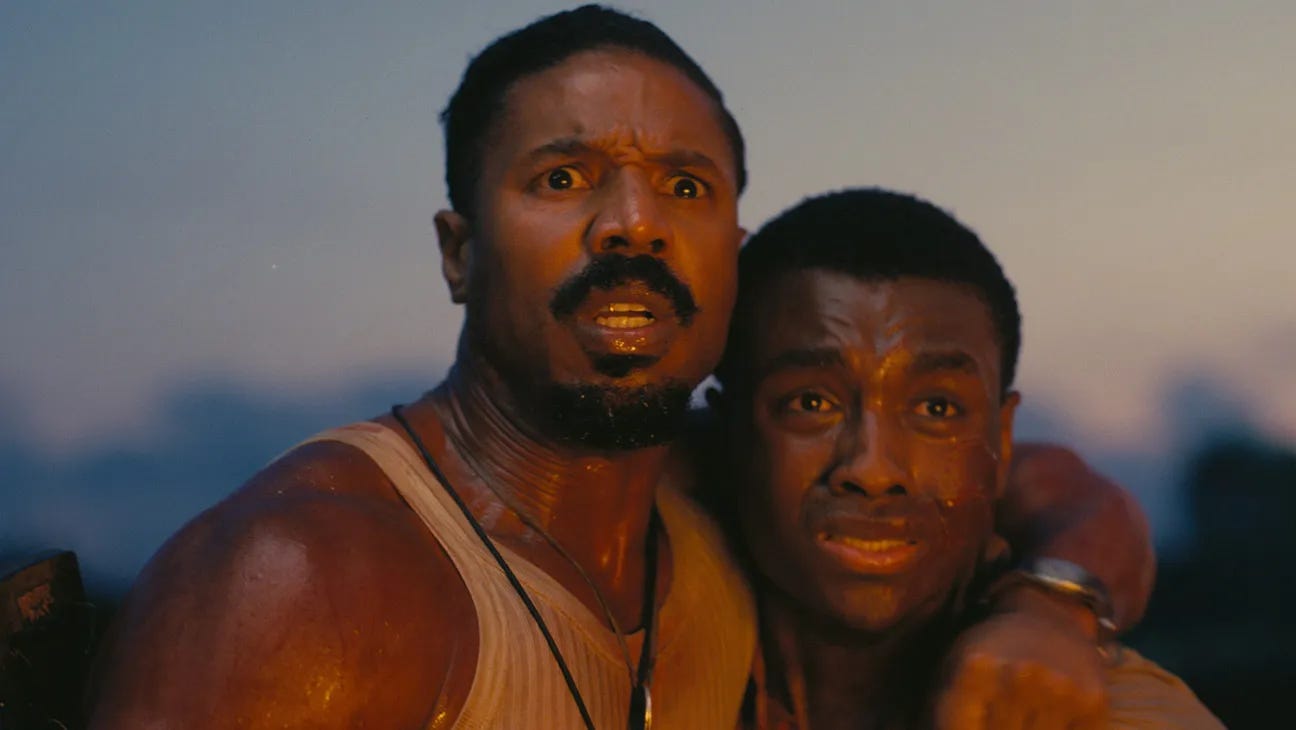“An artist is a sort of emotional or spiritual historian. His role is to make you realize the doom and glory of knowing who you are and what you are. He has to tell, because nobody else can tell, what it is like to be alive.” - James Baldwin
When Black Panther was released in 2018, it gripped the American moviegoing population in a way that might never be replicated, but Sinners is trying. It was not only a humongous commercial success, but it also fueled an ongoing renaissance of Black film directors. Ryan Coogler is at the helm of that generation, and his latest movie did not disappoint. He, through wizardry, made the vampires in this horror feel like a footnote in a rich tale about the soul tether between music and oppression. Coogler made the brutality of life as a sharecropper who lived in constant fear of white racial terrorism weigh on the heart of the viewer without making it the totality of the Black American experience. Black Americans have always fought to create spaces where they can be safe and free.
The movie was a true masterclass in storytelling, so imagine my shock when I get on Twitter(I am not supporting apartheid Edison’s rebrand attempt), and I see Latine people complaining about how there was not Latine representation in Sinners. A movie set in 1932 Mississippi, mind you. Like, let us be so serious. This is after the sequel to Black Panther, Wakanda Forever brought in Indigenous Mesoamerican culture and put it in conversation with the Afro-futurist themes of Black Panther. I do not think there were many Latine people, or even a decent chunk that were making this point. But any is too many. People might not remember, but this same thing happened after the release of Black Panther. The sentiment “Where is the Latino Black Panther?” was tweeted and retweeted for months by Latine people who considered themselves progressive.
When people were rightfully called out for centering a critical cultural moment for a lot of Black Americans on the gripes of another marginalized community, people often deflected. People argued that they weren’t criticizing Coogler or other Black directors, but making a broader point about the lack of inclusion of Latines in mainstream American media. But where was the energy for Latine representation in Everything Everywhere All at Once, or Crazy Rich Asians? Why is it only when Black filmmakers attempt to make movies that focus on and uplift their experiences that Latine people complain about not being included? And did those same people even go watch Blue Beetle, because the box office is saying no?
Thus, this critique reeks of anti-Blackness. Further, as these points are often made by non-Black Latine people, they also have a huge blind spot towards any roles played by Afro-Latine people like Colman Jason Domingo, Jharrel Jerome, and Tessa Thompson. I mean, our parents notwithstanding, Lupita Nyong'o has a stronger connection to Mexico than I do, and she identifies with Mexico so why cant’t Mexican-Americans be proud of her role in Black Panther? There are many books to be written about anti-blackness in the Latine community, and Afro-Latine people are doing that work. Professor Tanya Hernandez argues that mestizaje, a cultural notion that positions Latinx people as being a uniquely racially mixed people who all live in harmony with each other, regardless of race.
Black, Indigenous, or brown Latine people will tell you that this is bullshit, and that countries in Latin America have not let go of the caste system which the Spanish and Portugese introduced. White Latinx people are often the wealthiest people in each Latin American country, and they overrepresent themselves in the media. Instead of complaining to Black filmmakers, why are we not critiquing Mexican telenovelas, where all prominent and wealthy characters are white and every farm hand is a brown or Indigenous Mexican? Also, I know some people cannot even make sense of that sentence since the difference between race and ethnicity is like quantum physics in the Latine community.
I did not write this to do an off-the-backboard alley-oop on my community, although I will always dunk on us if I can. I wrote it because these complaints speak to a broader inability to effectively empathize and internalize art made by a community that someone is not a part of. When I watched Sinners, I did not only think about the brutality of Jim Crow in the South and the music that was born from that pain, but also of corridos and ballads of struggle immortalized by Mexicans. When I watched Black Panther, as with a lot of other Afro-futurist media I have sat with, I considered potential futures robbed from Indigenous North Americans by colonialism, along with those stolen from Africans. Everything Everywhere All at Once made me think of my parents and the way capitalism can rob immigrants of their joy. I do not need to have a narrative tailored explicitly to my community or directly be about my community for me to feel pleasure, connection, and power from a piece of media. Latine people do not need their own Black Panther; we need to get better at realizing how much we can draw and learn from the experiences of other marginalized communities in the United States. In acknowledging shared struggle, we will find the connections necessary to build community across ethnic and racial lines. That is how we win.
Closing Time
Thank you for reading another piece, and if you liked it I hope you will subscribe, like, or share. Hope everyone is taking care of yourselves, I will be back soon with more to to say Much Love.




